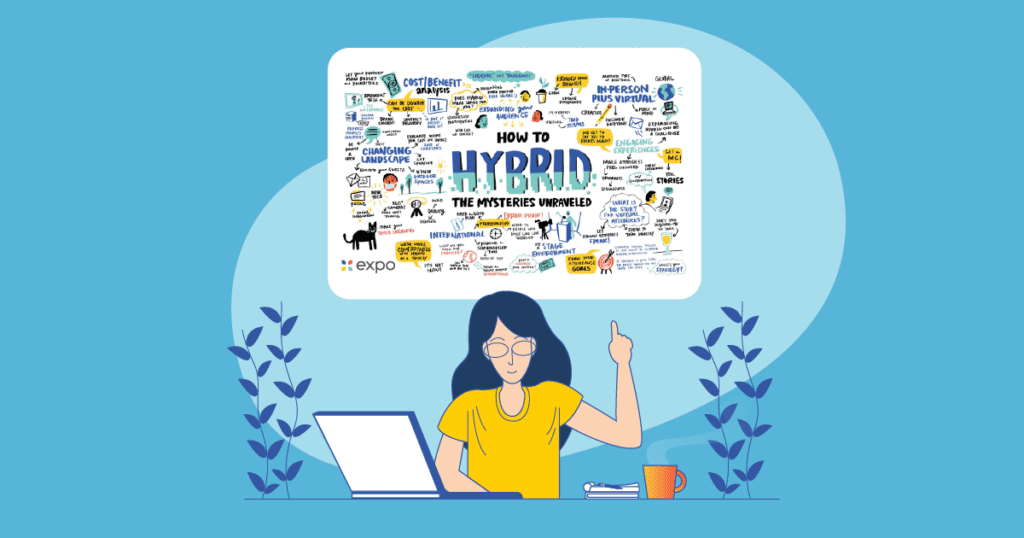Okay, planners, it’s time to talk about our favorite listeners—introverts. While this profession is full of bold and boisterous extroverts, you may be surprised to hear that it attracts just as many introverts. Learning how to understand your introverted colleagues is key to creating a well-rounded team.
Introverts don’t often get the spotlight they deserve. They’re usually considered shy or anti-social, but these things couldn’t be further from the truth. Introverts have special skill sets that make them invaluable to your team. Read on to learn about the mind of an introvert and how you can create a workspace that maximizes their potential.

Get perspective.
Let’s start with a basic definition: While extroverts thrive in highly social and busy environments, introverts prefer solitary spaces with no sensory overload. They prefer one-on-one conversations to large group discussions and generally listen more than talk.
This is just the tip of the introverted iceberg! There are some common misconceptions about them. For example, people think introverts are just shy, but it’s not that they’re shy, exactly. They just get their energy from internal feelings as opposed to the external world. A quiet night with a book is more rejuvenating than a night out with the crew.
Surprise! Introverts do enjoy socializing and need close relationships to thrive. It just depends on the environment and how many people are involved. Introverts prefer a few close relationships to a massive group, which means they’re the people you’re most likely to form a close bond with. Your introverts are the heart and soul of your team!
Keep in mind that these are generalizations and that every person is different. In fact, there are different kinds of introverts, too. We’ve listed a few below:
- Social introvert: prefers and enjoys small groups
- Thinking introvert: spends long stretches absorbed in their thoughts
- Anxious introvert: May feel shy, awkward, or anxious around others
- Inhibited introvert: Makes cautious and calculated interactions
Getting to know your introverted team mates is all about giving them the space to open up to you. Don’t assume they’re “just shy” or don’t want close relationships. Once they do open up, you’ll be surprised by the marvelous inner worlds they have to share.
Introverts’ strengths.
Unless you’re a hammer, every problem isn’t going to be a nail. This means you need a diverse range of skills to round out your team. Enter the introverts! They may be quiet in meetings, but they have special strengths that can transform your event planning process.
To start, they are exceptionally focused observers. They’re not just sitting quietly for no reason, they’re observing the environment, listening to what others are saying, carefully processing all of this information. This makes them great listeners and exceptionally adept at handling complex problems due to heightened critical thinking.
This deep thinking makes them especially effective during the early planning stages. An introvert will pour over every detail of the plan, imagining possible issues or questions that may arise. They may not jump right in with the solution, but when they do step forward, you can be sure it’s a strong, well-considered idea.
The thoughtfulness and empathy of introverts makes them, ironically, well-suited to leadership. While their extroverted counterparts may struggle due to their desire for the spotlight, introverts are more focused on the task at hand. They’d prefer not to have all the attention, but if they do take the lead, you can be confident in their ability to listen, consider all opinions, and decide on the best course.
When it comes to introvert’s strengths, their focused observing and deep thinking talents make them ideal for problem-solving, creativity planning, and empathetic leadership.
Create a comfortable environment.
So, you understand your introverts, that’s great! Now let’s talk about how you can create the perfect environment for them to thrive in. When doing this, keep in mind what an introvert needs to feel comfortable—space to be alone, a quiet environment, and personal autonomy.
Open offices may be all the rage, but they’re a nightmare for introverts. Make sure there are private spaces where they can retreat to work. Alongside private spaces, make sure the work environment isn’t too loud, bright, or generally overstimulating. Providing white-noise or noise-canceling headphones is an efficient way to solve any noise issues.
When it comes to meetings, remember that introverts prefer small groups. Organizing more intimate or one-on-one meetings with introverted team mates gives them the space to speak and think at their preferred pace. Avoid surprise meetings, too, so introverts can prepare for the meeting in order to feel confident in the discussion.
Other methods of designing a comfortable environment include making space for introverts to recharge on their own, away from work and colleagues. If you can, make sure the environment is warm and welcoming, without too much stimulation in the decor.
Remember, the best work environment is the one where everyone can feel their best!

Effective communication.
The success of your relationship depends on how well you establish avenues of communication. Introverts may not be as forthcoming as extroverts, but they have just as much to say. Learn how to communicate effectively and you’ll both thrive in the workplace.
At the root, it’s about active listening. Introverts like to know there is interest in what they’re saying, so lean forward, take notes, and summarize what they’ve said before asking a question or adding your input. This last point signals to them that you’ve been paying attention. Introverts can use the same process as a subtle step in asserting themselves more often.
Introverts like time to analyze. Don’t expect them to give you an immediate response, or bulldoze over a period of silence. In that silence, they’re doing what they do best, analyzing and understanding. Allow introverts time to reflect and come to you with a response they’re confident in. Establish a time when that response will be “due” so everyone is clear on expectations.
Extroverts, you may do your best thinking out loud, but this can accidentally overwhelm your introverted team mates. They’ll try to think of a response to each point your saying, not knowing that you aren’t even sure about these points. Let them know you’re thinking out loud and be clear about what needs a response and what doesn’t.
Balancing social and alone time.
A happy introvert is an introvert that achieves the perfect balance between alone time and social time. Good news introverts, there are even ways to be energized in social situations. It’s all about what you do and how much of it you do.
Prioritize social activities that you enjoy doing and that line up with your values. If you love reading, find a book club or organize one with fellow colleagues. If you enjoy dancing, go out to a salsa lesson as opposed to a noisy bar. The question isn’t to socialize or not to socialize. It’s more important that you choose an activity that harmonizes with your interests.
Avoid overcommitting. We’re in a phase right now where overcommitment, or “being busy,” is seen as “being successful.” However, these are not the same thing. If you’re feeling drained, consider scaling back your commitments to focus on the ones that really matter to you.
What you do when you’re being social matters, and the same applies to when you’re having alone time. If you’re sitting in a dark room listening to moody music, odds are you’re gonna feel pretty low. Engage in rejuvenating activities like yoga, a hot bath with some candles, reading, painting, or playing your favorite video game. Whatever makes your heart sing (yes, even if that is sitting in a dark room listening to moody music)!
We need introverts.
Event planning isn’t just for the extroverts. This marvelous profession has room for people of all personalities, and that’s what makes it so special. You never know who you’re going to meet, or what they’re going to bring to the table. While introverts may seem shy, there’s a lot more to them than meets the eye(that rhyme was unintentional).
Get to know the introvert’s perspective and then create a work environment that maximizes their natural strengths, such as focused observation, critical thinking, and even leadership(we’re still in shock about that one). What it comes down to is learning how to communicate, which is the cornerstone of the event planning game!
Lastly, remember that event planning isn’t just available for all personalities, it actually needs all personalities to thrive. Extroverts, introverts, and all those in between, we’re better when we work together.







